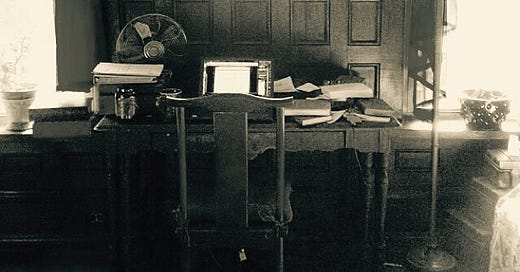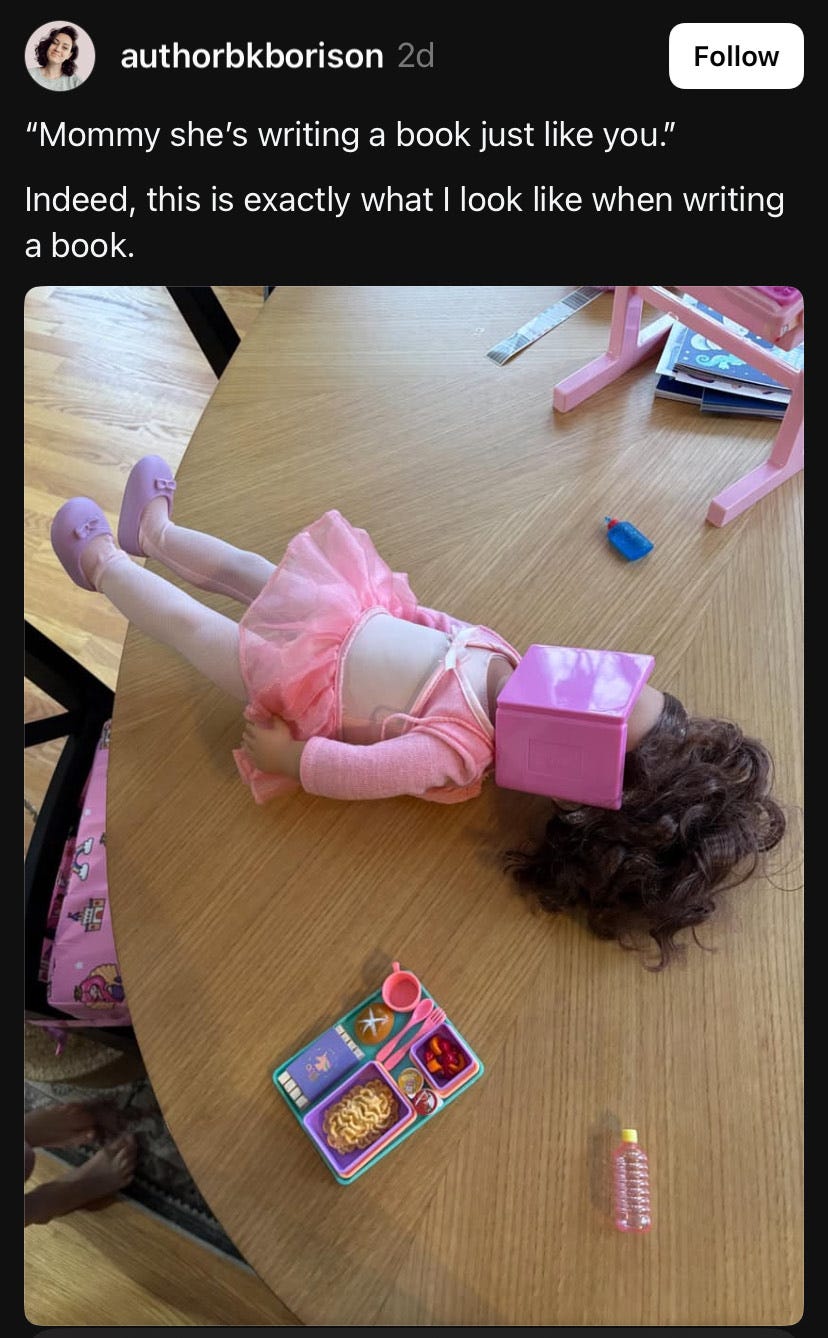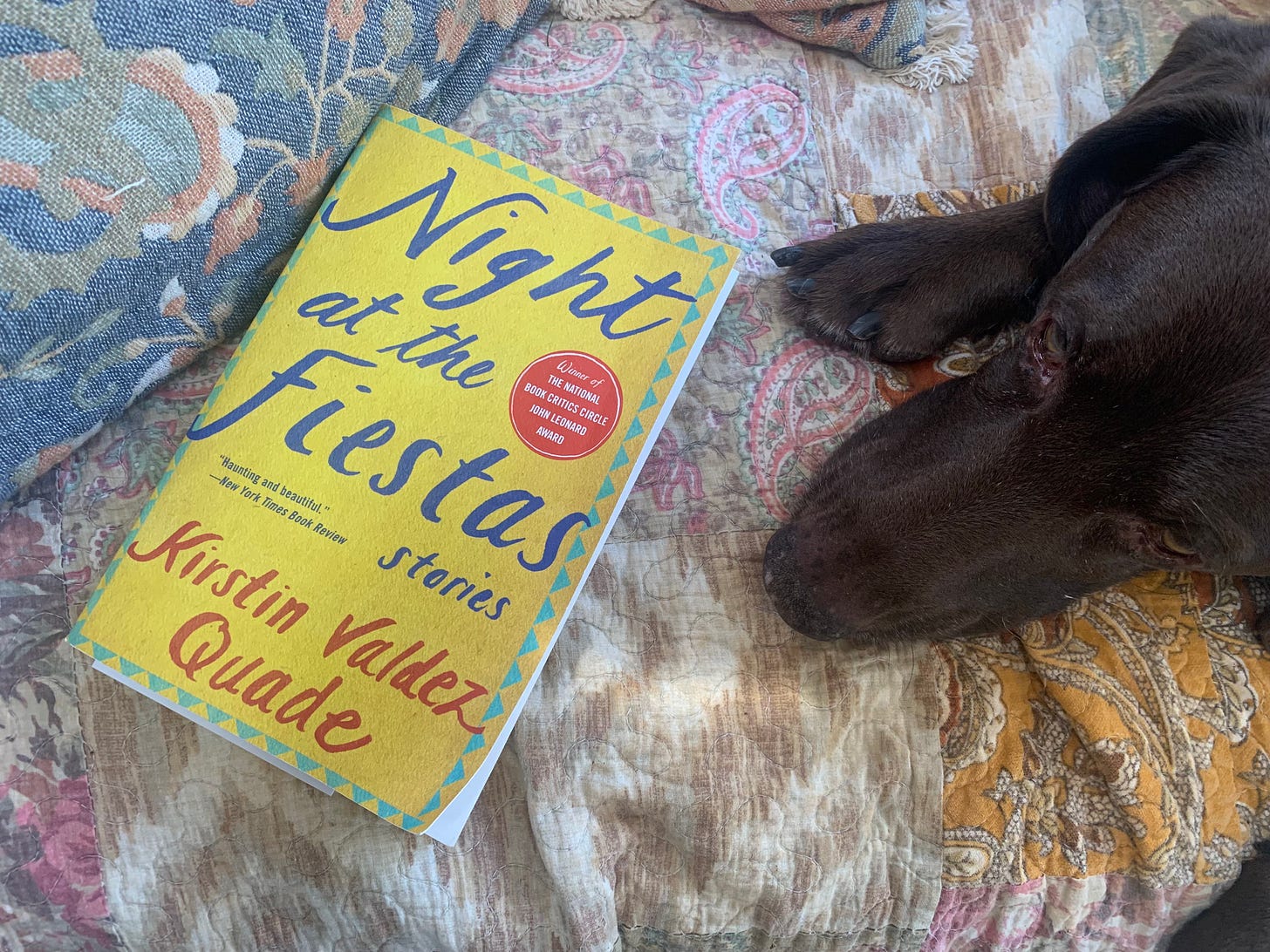[I made this photo my cover photo on my Facebook page in 2016 when I started writing On Reading Well. After my bus accident in 2018, I could no longer sit at a desk and chair like this to work.]
“What do you do?”
I was at a small Christmas gathering last week, talking with someone I’d just met when the question that always comes up in these conversations did.
“I’m a writer,” I said.
My interlocuter’s eyes widened, and so did her friend’s.
“What’s that like?” she asked excitedly.
“Well,” I said, pausing for a few beats. “It’s stressful.”
I could tell that was not the answer she and her friend were expecting. They both responded by saying they thought of being a writer as romantic and exciting and cool.
My husband, seated next to me, hastened to chime in, “I can confirm. It is stressful.”
I’ve been thinking ever since about why I answered that way—and why I would give the same answer again.
Some years ago—while teaching was still my full-time calling, but I was beginning to write and publish a lot more—my friend Nick asked me if I wanted to write full-time. I said no. Nick asked why not, and I gave two reasons. First, I loved teaching and couldn’t imagine not being in the classroom. (That’s something I no longer have to imagine, and it’s still hard to process.) The second answer was that I feared having to spend that much time in my head.
So, here I am. I spend a lot of time in my head. And it’s stressful.1
Why is writing so stressful?
Well, I think writing is always stressful, to some degree, for writers who are serious about the craft. No matter how good (or poor) you are at it, you can always be better. And you are never really done writing anything. Instead of perfection, you have deadlines.
Every writer has a different part of the process that causes the most stress. For me it’s generally the first 80% or even 90% of the process. The part I love most is the last part: searching for the best word, moving the parts of sentences, refining, polishing, exacting.2 Until I get to that point, I am generally despairing that I have the ability to do the project at all. I berate myself for agreeing to do it in the first place. What was I thinking? How did I get myself into this mess again??? Until I’m at those final steps of revision (which I love so much), it feels like I will never get there. I can’t see the end at all. I would completely despair if I hadn’t gone through the process so many times that I know I will get there regardless of how I feel. I have learned to trust the process. But still, in the process, what I feel is stress.
So the first thing that’s stressful about being a writer is, in short, writing.
But the more I think about the stress, the more I realize that the second source is even greater—and that’s the economics of it. Yep, the money.
Until last year, I wrote and spoke on the side, in addition to my full-time work (and full-time salary) as a professor. Having been a professor for 24 years, I had a long-established stability and consistency of income in my life. To be sure, I never made a six-figure salary as a professor the way most college administrators do (even when I was an administrator). But it was still steady and reliable income to which my income from writing and speaking was merely a supplement.
Now the supplement is my salary. That is really stressful. To be clear, my husband works as a public school teacher, so we won’t starve if I don’t bring any money in. (But health insurance is expensive, and when he retires soon, I won’t have it through his work. That is stressful, as I know many of you know well.) We’ve had discussions about whether I should a find full-time job just for the health insurance. But he is insistent that we will be ok and that I shouldn’t give up my writing. (I got a good one in that man!)
I have definitely put a lot of pressure on myself during the last year or so to produce writing that brings in more income. It’s wild that not too many years ago, when I saw the transition to the “gig economy” taking place in our culture and observed so many of my students living and working that way, I never imagined that I would be doing the same. But here I am.
However, I don’t want to minimize where I am and what I have.
I am not the most gifted or literary writer I know (by far). I am not the most brilliant mind offering world-changing insights. I am not even close to being a NYT bestselling writer.3 But I am a writer who is highly educated, highly experienced in my field, and—as a result of these two things combined with years and years of work—I am fairly well-connected in the publishing world. What I am doing now is the fruit of decades of work.
[Side note: I love, love, love what
describes here at the Empathy List about how much the work and the people are part of writing success]:It is a lot of work.
So I thought I’d list out for you (and for myself) what I’ve written (not necessarily published) this year alone:
A book (look for its release next summer!)4
An academic paper on Phillips Brooks presented at Virginia Theological Seminary (publication forthcoming)
An academic paper on 18th and 19th century English Baptist girls’ education presented at Westminster College, Cambridge (publication forthcoming)
A chapter on reading the Bible for this forthcoming academic book on Christianity edited by Anthony Bolos
A re-write of a chapter I am contributing to this forthcoming book edited by
A foreword for this forthcoming book by Nicholas McDonald at
An author interview with E. Lily Yu at Christianity Today
An essay at Christianity Today
Monthly columns at Religion News Service
Weekly Substack newsletters
A poem published in The Way Back to Ourselves (which was nominated for a Pushcart Prize!)
To be honest, I am going by memory here and not checking with my calendar. So I’m sure I’ve left out some other things I’ve written. (Looking at my calendar also gives me stress!) I also should have had two book review essays on this list, but I’ve had to seek extensions on most of my work these past few months because I got so behind caring for my mother until her recent death and the mourning that has followed.
This list does not include speaking engagements (the content of which is generally derived from my writing).
And it doesn’t include the book endorsements I’ve written (usually several a year). Book endorsements are another task of the writing life. It is a professional obligation, in my view, to be as generous as one can in supporting other writers. After all, I rely on their generosity, too. Book endorsements aren’t a lot of writing, of course, but they do require a lot of reading. And most of my reading is, by necessity, related to my own writing. (See the picture below. It’s me!)
Speaking of reading, I’ve long given my short bio as “reader, writer, professor.” And putting “reader” first is very intentional. I have always been a reader first. But I read far less than I would like to because … I’m always writing. Fortunately, most of my writing is the kind that requires research (reading), but it still leaves me less time to read what I just want to read—for fun.
So, yes, I am a writer. And I am really, really grateful that I can say that I am.
This essay was about just one aspect of being one (the stress and the work!), but that doesn’t mean I don’t love what I get to do. I just think it’s important not to romanticize all the work and risks that the writing life requires.
In a future post (when the spirit moves), I will share some things about how I write. (Thanks to
for prompting me to write this post and the next one.)Next week, at the start of the new year, we will begin our slow journey through Paradise Lost. The poem is divided into twelve books, and in the Penguin edition I’m using, each book is around 20 pages. You can also read it online here. I think it will be a good challenge—a practice, a discipline (and hopefully a pleasure)—to try to read this much (this little?) poetry each week. It will be for me, too! So I encourage you to give it a try. If you are a New Year’s Resolution kind of person, then this might be a great resolution!
***
"Absolutely unmixed attention is prayer.”5
***
BOOK NOTE:
Despite all the writing-related reading I must do, I try to make time always to be reading something for my own enjoyment. What I’ve been reading over Christmas is this gem of a short story collection, Night at the Fiestas, by Kirstin Valdez Quade. The person who recommended the book to me said the stories have a Flannery O’Connor feel to them. How could I resist? He was right. I am smitten with this book and this author.
Happy New Year!!!
I am also a Highly Sensitive Person, which is probably one big reason I feel overwhelmed so easily and so often. I’m half introvert and half extrovert (a bit more of the former), but HSP and the sense of overwhelm comes not from people per se but from having so much to do that I can’t measure tangibly since writing is so qualitative. I love people but I can’t enjoy being with them if I don’t know how far from being “done” my writing is. I’m working on taking on fewer writing commitments so that I can be “done” a bit more often. (Thank you to
for introducing me to this condition.)Not the proofing! That is not my strength. I prefer to leave that to the experts at my publishing house and people like my friend
, who so graciously and skillfully proofs these newsletters each week!One of my absolute favorite quotes from Flannery O’Connor is this one (found in Mystery and Manners): “Everywhere I go I'm asked if I think the university stifles writers. My opinion is that they don't stifle enough of them. There's many a best-seller that could have been prevented by a good teacher.”
I had written one chapter for the book proposal last year, but began writing the rest of the book in January. It is my shortest book! I basically wrote a chapter a month.
Simone Weil, Gravity and Grace, trans. By Emma Crawford and Mario von der Ruhr (London: Routledge, 2002), 117.








Thanks for this article, Karen. I’m not sure if this was a conscious thing when you wrote but your transparency about the stress of writing, and the painstaking process behind it, is incredibly refreshing. It’s pretty easy for respected writers like yourself to give an air of casual panache about the work but your focus on the graft and grace it involves speaks (unsurprisingly) to your integrity and humility in crafting words. Thanks for your inspiring and grounded example.
As a side note: I’m looking forward to the Milton readings enormously!
Your academic paper on English Baptist girls' education sounds very intriguing.
I understand the risk aspect completely. For multiple good reasons, I walked away from a regular job with regular salary, so every month is a financial adventure, sometimes a quiet ride, sometimes a edge-of-your-seat nailbiter. Thankfully, health insurance is one aspect I don't have to consider [although the provincial health insurance doesn't cover medication for working age adults - my asthma medication takes a large chunk out of my tiny, wildly fluctuating income, yet I have always had enough to cover it]. I have a great respect for those who write, or otherwise create, freelance.